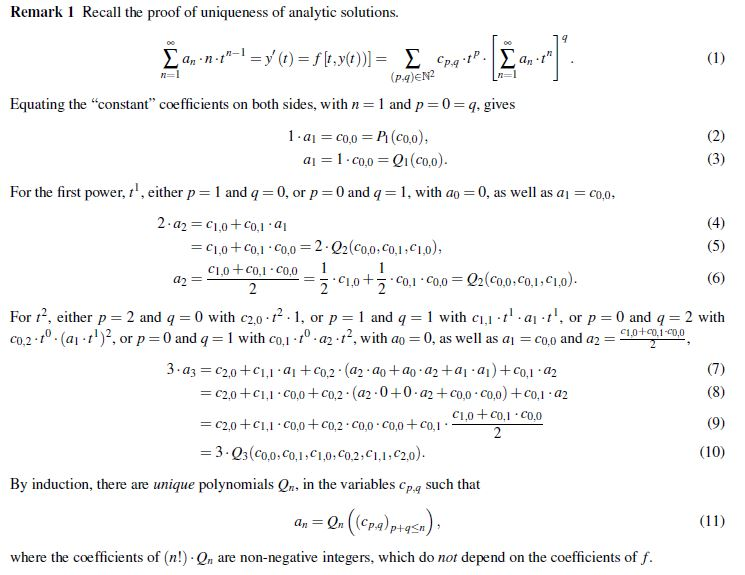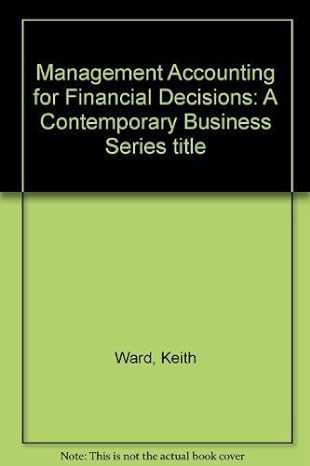

Remark 1 Recall the proof of uniqueness of analytic solutions. 9 00 p.q.tp (2) (5) {anin.ph-1 =y' (t) = f (1,8(t))]= { (1) (p.q)EN2 Equating the "constant" coefficients on both sides, with n=1 and p=0=4, gives 1.a1 = 20,0 = P(000), ap=1.00,0 = Qi (00,0). (3) For the first power, t', either p = 1 and q = 0, or p=0 and q=1, with ao =0, as well as a1 = C0,0, 2.22 =21,0 +0,1.01 =C1,0 +0,120,0 = 2 Q2(00,0,0,1,01,0), C1,0 +0,1.00.0 a2 2.440+2.00,1-C0,0 = 22[000.00,1,C10). 2 For t?, either p = 2 and q = 0 with C2.0.7. 1, or p= 1 and q = 1 with C1,1.1.0-t'or p = 0 and q = 2 with C0,2-4. (air), or p=0 and q=1 with co,120.22-12, with ao = 0, as well as ai = c0,0 and a2 = 01.0+0,1-0,0 3.az = C20+1,10 +0,2. (a2-20+20 a2 + a, a) +0,122 (7) = 02.0+C1,1.00.0 +0,2. (a2-0+0.22 +00,0-20,0) +20,102 (8) C1,0 +0,100,0 = C2,0 +1,1.00.0 +00,200,000,0 +0,1 (9) 2 = 3.03 (C0,0,0,1,C1,0,0,2,1,1,C2,0). (10) By induction, there are unique polynomials Qn, in the variables Cpg such that an = Q-((cp.a) prasm) (11) where the coefficients of (n!).Qare non-negative integers, which do not depend on the coefficients of f. Problem 2 Determine the radius of convergence, R, of the Taylor series for the majorant" function Y defined by Y(t)=r. 1- ['-v1+ 1 +2.M(1-4) - [ { An:". (12) Recall that the radius of convergence R is also the radius of the largest disc 02 (0,R) where Y is holomorphic. Remark 1 Recall the proof of uniqueness of analytic solutions. 9 00 p.q.tp (2) (5) {anin.ph-1 =y' (t) = f (1,8(t))]= { (1) (p.q)EN2 Equating the "constant" coefficients on both sides, with n=1 and p=0=4, gives 1.a1 = 20,0 = P(000), ap=1.00,0 = Qi (00,0). (3) For the first power, t', either p = 1 and q = 0, or p=0 and q=1, with ao =0, as well as a1 = C0,0, 2.22 =21,0 +0,1.01 =C1,0 +0,120,0 = 2 Q2(00,0,0,1,01,0), C1,0 +0,1.00.0 a2 2.440+2.00,1-C0,0 = 22[000.00,1,C10). 2 For t?, either p = 2 and q = 0 with C2.0.7. 1, or p= 1 and q = 1 with C1,1.1.0-t'or p = 0 and q = 2 with C0,2-4. (air), or p=0 and q=1 with co,120.22-12, with ao = 0, as well as ai = c0,0 and a2 = 01.0+0,1-0,0 3.az = C20+1,10 +0,2. (a2-20+20 a2 + a, a) +0,122 (7) = 02.0+C1,1.00.0 +0,2. (a2-0+0.22 +00,0-20,0) +20,102 (8) C1,0 +0,100,0 = C2,0 +1,1.00.0 +00,200,000,0 +0,1 (9) 2 = 3.03 (C0,0,0,1,C1,0,0,2,1,1,C2,0). (10) By induction, there are unique polynomials Qn, in the variables Cpg such that an = Q-((cp.a) prasm) (11) where the coefficients of (n!).Qare non-negative integers, which do not depend on the coefficients of f. Problem 2 Determine the radius of convergence, R, of the Taylor series for the majorant" function Y defined by Y(t)=r. 1- ['-v1+ 1 +2.M(1-4) - [ { An:". (12) Recall that the radius of convergence R is also the radius of the largest disc 02 (0,R) where Y is holomorphic








